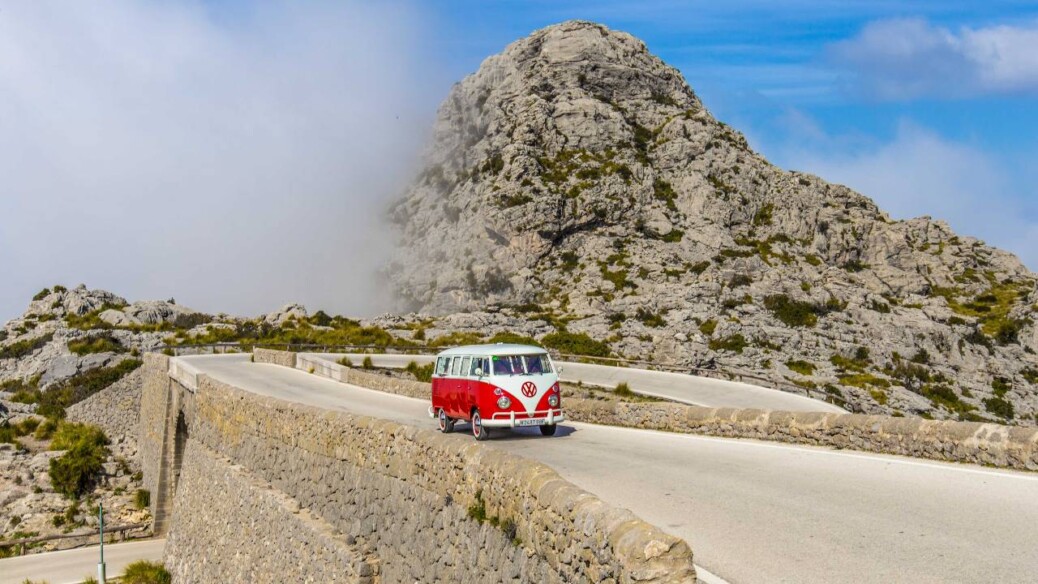Have you ever thought of going to Spain with your VW Bus? According to us, Buslife in Spain should be high up on your list of things to do and places to go. The country is made for Buslifers, as it offers a bit of everything. In this guide, we will walk you through all you need to know about Buslife in Spain.
About Spain
First and foremost, Spain is a beautiful country. Its great weather and stunning beaches attract the majority of tourists, but the country has so much more to offer. Perhaps its greatest attraction is the huge diversity. Those who have visited Spain know that there is a big contrast between the north and south of Spain. The north is known for its beautiful cliffs and rugged landscape. This is where pilgrims walk for weeks on end to reach Santiago de Compostela. Rain is more common in this part of Spain, as temperatures are a lot lower than in the rest of Spain.
The south, in contrast, experiences some serious heat, causing an almost desert-like landscape in summers. This part of Spain has a rich, traditional Spanish feel to it. The south harbors the history-filled cities of Malaga, Granada, and Sevilla.
Other contrasts include nature versus city life. The vibrant cities of Barcelona, Madrid, and Valencia attract many people. Nature lovers find their way in mountain ranges like the Pyrenees, Picos de Europa, and the Sierra Nevada.
Whatever it is you are interested in, Spain offers it!
Buslife in Spain: Camping
Around Spain, you will find it relatively easy to spot places to park your VW Bus. There are many designated open bus spots where you can park up for free. These are usually found on the coast just outside of the main parts of a city or town.
The name to look out for is Area de servicio para autocaravanas. So research online before going to a place. Note that some of these places do not have a toilet or deposit for waste. People who travel in Spain by camper usually mix between staying in the wild and parking up on a campsite (to deposit waste, get access to gas and water).
City camping
Parking in cities is usually restricted to city campsites. Inner cities are becoming less and less accessible to larger vehicles, something to keep in mind. As mentioned before, just outside of the main parts you will easily find campsites and free parking lots for campers, caravans, and buses.
When it comes to road quality, Spain really stands out in Europe. The roads are of tremendous quality and are maintained very well. You will even find that quiet roads far away from the main parts are of exceptional quality. In addition, you will often find two ways of reaching a place: The paid highway and the free slower highway/road. Depending on your pace and budget, you can make the right choice for yourself and your current situation.
Places to visit
Besides the main parts we have mentioned before, we will now list a couple of less well-known places you may want to consider visiting:
- Playa Berria – A quiet beachtown with a stunning setting surrounded by mountains.
- Ribadesella – A special town uniquely surrounded by mountains and with lots of camping options.
- Arcos de la Frontera – The white villages of Spain are a must for any visitor, and this place is the perfect spot to get started!
- El Palmar – A paradise for surfers!
- Parque Natural del Cabo de Gata-Níjar – One of the most beautiful and most remote parts of Spain.
- Calpe – A popular coast town with lots of campsites to refuel!
- Mar Menor – Set between a lake and the sea, a narrow strip of land offers stunning sights and swimming options!



The best roads for Buslife in Spain
Spain offers stunning and dramatic landscapes, and oftentimes traveling by road is the perfect way to experience the Spanish landscape. These are some of the scenic routes you should consider taking:
- Ruta de los Molinos: Castilla-La Mancha (middle of Spain)
- Vía del Cantábrico: País Vasco, Cantabria, Asturias and Galicia (north of Spain)
- Ruta de los Pueblos Blancos: Andalucia (south of Spain)
- Costa Blanca: Alicante, Calpe and Valencia (east of Spain)
Seasonal jobs in Spain
Are you planning on a long-term stay in Spain? If so, you might consider getting a seasonal job to bring in some money. If you are from European soil or have a passport or residency in Europe, you can get a job in Spain without too much paperwork. However, there are some things you need to know.
First, Spain has one of Europe’s highest unemployment rates. Whenever a job opening becomes available, it usually attracts tens if not hundreds of applications. Hence, without having a network or direct contact, it is hard to land a job.
Secondly, Spain is buzzing in July and August during the summer months. Spain’s biggest economic asset is its tourism, which sees millions of people entering the country during a very small part of the year, whereas the remainder of the year it is relatively quiet. As such, demand for seasonal workers skyrockets in summer. This is mostly revolving around the resort and tourist towns along the coast, where you can find work in hotels, bars, restaurants or even as a lifeguard.
Thirdly, Spanish people speak very poor English (in general), which can be seen as a plus or a minus. If you do not speak Spanish, it will be hard to land a job. If you do speak Spanish (as well as English), you have a great advantage in the job market.
Favoring remote work
In our experience, landing a job is a little tricky in Spain, and it would be better and easier to find a way to work remotely. Read more about that in the following articles:
- The Legalities of Remote Working
- How to Have Access to Wifi on the Road at All Times
- 10 Courses to Get Your Digital Nomad Career Started
- Buslife & Remote Work: The Perfect Marriage
- 10 Digital Nomad Jobs That Keep You Traveling
Volunteering in Spain
If you are not necessarily looking for an income, a whole new world of options opens up to you, whereby you can work in exchange for housing or simply volunteer your time for a charity. Here is a list of options to explore:
- Wwoof: Work exchange on organic farms
- Helpx: Farms, homestays and more
- Workaway: Working holidays and cultural exchange
Ridesharing is popular in Spain, with Blablacar and Amovens as the leading platforms. Use these platforms to cut costs by having people drive with you. This is a great way to learn more about Spanish culture and places to visit.
Words you need to know
Apps like Duolingo help you get a grasp of basic Spanish vocabulary. We highly recommend using it before and while you are in Spain, as Spanish people don’t tend to speak English well. To get you started, here are ten simple sentences:
- My name is … – Me llamo …
- Hi, I am … – Hola, soy …
- Good morning – Buenos días
- Thank you – Gracias
- Good afternoon – Buenas tardes
- How are you? – ¿Cómo estás?
- Good night – Buenas noches
- You are welcome – De nada
- Please – Por favor
- How are you? – ¿Cómo estás?
Conclusion
We hope this guide has inspired you to look at the option of living the Buslife in Spain. The country is extremely diverse and therefore suitable for travelers who want to explore as many different things as possible. Its bus-friendly environment is also a great attraction for Buslifers. Will you go to Spain after reading this? Let us know in the comments!


